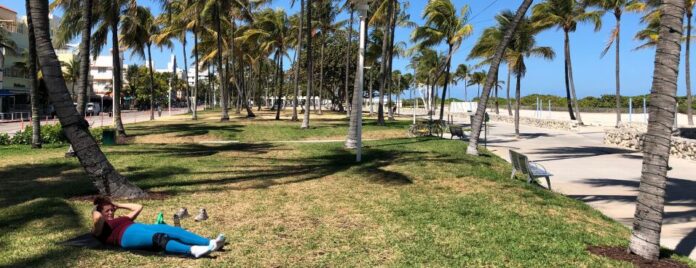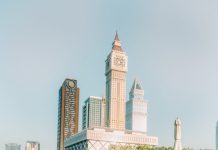Much of the country may be returning to normal this year but international travel to the U.S. won’t be back to pre-pandemic levels until 2024 at the earliest.
Those industry projections are in large part because of long visa wait times in some of the biggest markets for international travel to the U.S.
Inbound travelers can expect to wait 702 days in Guadalajara, Mexico, 354 days in Sao Paulo, Brazil, and 643 days in Bogota, Colombia, as of this month.
“We need to make it so that all visitors who want to come here can,” said Tori Barnes, executive vice president of public affairs and policy at the U.S. Travel Association. “International travelers spend more and stay longer when they come,” compared to their domestic counterparts.
While U.S. Citizenship and Immigration Services, a subunit of the Department of Homeland Security, has come under fire for prolonged processing times for benefits like green cards and work permits for visa holders, securing a visa through the State Department has become a major hurdle for international tourists and business travelers, foreign workers, and immigrants seeking family-based green cards.
Backlogs at U.S. embassies and consulates are driven in part by a post-pandemic hangover and the immigrant visa bans carried out by the Trump administration. The State Department is also struggling to recover from staff attrition over recent years. But industry groups say the U.S. could do more to expedite visa processing with steps such as virtual interviews for applicants.
Business Impact
International visitors typically make up about half of business and tourist travel to the Miami area—two-thirds of which is from South American countries, said Rolando Aedo, chief operating officer at Greater Miami Convention & Visitors Bureau. The slow rebound of international tourists has been offset, so far, by an increase in domestic visitors to Miami, which reopened earlier than much of the country after the pandemic, he said, but the area is still losing out on that economic activity.
In a recent visit to Brazil, visa wait times “came up in most of my conversations,” Aedo said.
“It’s not allowing us to fully maximize the benefit not only to Miami, but to Florida and the country as a whole from the economic impact that generates for us,” he said.
Eleven out of the top 20 inbound markets for the U.S. are visa waiver countries, meaning business and leisure travelers can get expedited travel authorization. But Brazil and most other Latin American countries have not been approved for such waivers. Chile is the lone exception.
Tourism advocates have targeted an expansion of visa waiver designations, which are decided by the State Department in consultation with the Department of Homeland Security. But they say the State Department can also take more immediate steps to reduce processing times.
While the hospitality industry has missed out on international travel, hotels and other businesses have struggled to bring in the seasonal workers necessary to keep operations running.
Visa interview wait times have also snagged managers and specialty occupation workers for key roles at U.S. companies.
“Prior to the pandemic you could get an appointment within a week,” said Theda Fisher, an attorney at Withers Bergman LLP. “We’re seeing five, six, seven month delays to get an appointment, which is definitely causing issue for U.S. employers, as well as employees coming to work in the U.S. because they just can’t get a definitive timeline.”
Those wait times, too, have disrupted plans of clients seeking to travel to the U.S. for conferences or to negotiate contracts, she said.
“Obviously we are in a labor shortage,” said Nandini Nair, an attorney at Greenspoon Marder LLP. “Employers need these foreign employees, who they’ve sponsored and spent thousands of dollars getting approval for, to be able to come and fill that talent gap right now.”
Solutions
Travel industry groups called on the Biden administration this month to drop a requirement that vaccinated travelers test negative for Covid-19 before flying to the U.S. Changes to that mandate would be decided by the Centers for Disease Control and Prevention.
The American Immigration Lawyers Association has pushed for the State Department to boost hiring, expand use of visa interview waivers, adopt virtual interview options, and add stateside processing of visa renewals—all steps the group says would reduce backlogs for immigrant and nonimmigrant visas.
Wait times, too, vary by region and consulate, which face different local conditions and volumes of applications.
A State Department spokeswoman said the agency is committed to lowering wait times as quickly and safely as possible.
“We will continue investigating ways to creatively reduce wait times for visa interviews in collaboration with our interagency partners, while ensuring a secure and efficient visa process,” the spokeswoman said.
Commitments by political leadership to address wait times, and steps already taken to expand interview waivers for applicants who previously received visas, are encouraging, said Sandra Sheridan Reguerin, a partner at Fragomen, Del Rey, Bernsen & Loewy, LLP.
“Tourists are going to be the very last priority, which isn’t good for businesses here who rely on tourism,” said Reguerin, a member of AILA’s Department of State Liaison Committee.
Barnes of the U.S. Travel Association said the whole government should focus on restoring travel to the U.S.
“We need to bring back international travelers and these workers in a more quick and efficient manner,” she said.













